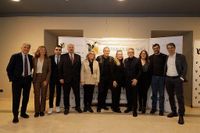The 18th edition of the Festival Tulipani di Seta Nera opened with a heartfelt tribute to the late Eleonora Giorgi, an actress whose courageous battle with illness inspired many. The event, dedicated to social cinematography, is set to take place from May 8 to May 11, 2025, at The Space Cinema Moderno in Rome.
During the opening ceremony, Barbara De Rossi, the godmother of the social film selection for Rai Cinema Channel, spoke passionately about Giorgi's impact. "She broke through a wall; I don’t remember illness ever being portrayed with such courage as she did," De Rossi stated. Her remarks highlighted a significant cultural shift in how illness is perceived in society, noting that in the 1980s and 1990s, many would hide their illnesses to avoid stigma.
Pino Quartullo, the event's godfather, also remembered Giorgi fondly, describing her as "an artist who never gave up and was always dreaming and planning until the end." He revealed that they were collaborating on a theatrical adaptation of the film "Un tocco di classe," which would have showcased Giorgi's talents in a new light.
The festival aims to place the human experience, diversity, fragility, and uniqueness at the forefront of storytelling. This year, a remarkable 500 works have been registered in four categories: 300 short films, 70 documentaries, 80 SocialClips, and 50 digital series, reflecting a wide range of perspectives from around the globe.
Of these entries, 97 works have been selected for the Premio Sorriso Rai Cinema, which will be available for viewing on the Rai Cinema Channel platform from April 1 to May 11, 2025. The voting period for views will run from April 1 until April 30, with the top five works in each category vying for the prestigious award.
Diego Righini, president of the festival, used the occasion to advocate for reform in the tax credit system for independent films. He emphasized the need for greater institutional support for moral and social cinema, particularly for films addressing themes such as disability, gender-based violence, integration, legality, sustainability, and workplace safety. "Quality moral and social cinema needs the right attention from institutions," Righini asserted, arguing that larger corporations should contribute more to smaller producers and authors.
Notable personalities at the event included Paola Tassone, the festival's artistic director, Lorenza Lei, head of Cinema and Audiovisual for the Lazio Region, and Paolo Del Brocco, CEO of Rai Cinema. Del Brocco celebrated the festival's 14-year collaboration with Rai Cinema, underscoring the importance of ongoing awareness-raising on current issues through film.
The selected films tackle various pressing social issues, including health and disability, bullying, gender stereotypes, environmental concerns, technology, labor rights, legality, and war. This year's edition places a particular emphasis on the physical and psychological fragility of human beings, aiming to foster reflection and awareness among viewers.
Among the prominent figures featured in the selected works are well-known actors such as Claudio Amendola, Antonio Catania, Anna Ferzetti, Massimiliano Vado, Ettore Bassi, Lorenzo Flaherty, Luca Ward, Franco Oppini, and Pietro De Silva.
In the short film category, directed by Paola Tassone, 65 works have been selected, with 64 hailing from Italy and one from Russia. The geographical distribution of the Italian entries shows Lazio leading with 25 works, followed by Campania and Puglia with six each, and Lombardy with five. Other regions contributing include Sicily and Veneto with four each, and Tuscany, Piedmont, Marche, and Liguria with two each, while Calabria and Emilia-Romagna each have one entry.
For the documentary section, directed by Christian Carmosino Mereu, 16 titles have been chosen, of which 15 are from Italy and one is a co-production between China and Italy. Here too, Lazio leads with six documentaries, followed by Lombardy with two.
The #SocialClip section, directed by Claudio Guerrini, features 16 Italian works, including two in English and one in Spanish. Lazio again dominates with eight entries, followed by Lombardy with three and Campania with two.
The Festival Tulipani di Seta Nera aims to be a cultural and institutional highlight, supported by various organizations, including the Ministry of Culture, the Ministry of Labor and Social Policies, and the Lazio Region. Cultural partners include ANMIL, ASVIS, ENS, and the Movement for Justice, while Rai Cinema Channel and Rai for Sustainability ESG are event partners, with Frecciarossa Trenitalia serving as the official train of the festival.
As the festival approaches, it promises to be a powerful platform for voices that often go unheard, showcasing the strength and resilience of individuals and communities through the lens of cinema. With its commitment to addressing critical social issues, the festival not only celebrates artistic achievement but also fosters a deeper understanding of the challenges faced by society today.







